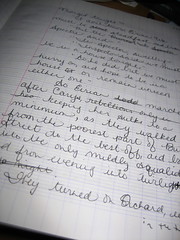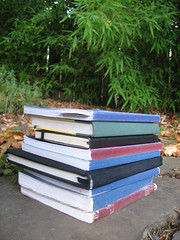Here’s yet another of those topics I’d have sworn I’d already covered here, but apparently I have not.

The other day I finished writing a longhand draft (126 pages, not pictured) of a long novelette. The problem that then confronted me was that I had to get the thing typed into the computer in time to send it to my critique group in only a couple of days (in case you were wondering why I hadn’t blogged recently!) I posted about this challenge on Facebook and Twitter, and one of the responses on Facebook was: “You can do it, but why would you write in longhand to begin with? Embrace the 21st century!”
Which is how I ended up discovering I don’t have a blog post about this to which I can direct people when they ask, because they do ask. I have mentioned my process obliquely but never written up the defense I’ve had to give verbally many times.
Why I write longhand first drafts
1. Transcription is revision: When I transcribe a finished draft into the computer, I don’t type it exactly as I wrote it. It is no more effort to type different words than it is to write the same ones — and less if I can make the sentence smaller (which usually means clearer and more efficient). When I transcribe a story, I reconsider every single word in a way I simply don’t when reading a typed document. This is by far the most important reason I write longhand. The draft that goes in the computer — the first one anyone else can read (given how my handwriting gets when I’m in a hurry, quite literally) — is lightyears better than the handwritten draft that no one sees. Rewriting the entire story, starting at the beginning, with the end freshly in mind allows me to grasp the story as a whole and helps me improve continuity, too.
2. Process: A related point. When I’m writing a rough draft, I don’t always know what the characters’ names are, or what precise order things should follow. Rekeying the entire story means I can easily replace the placeholder names (or epithets) on the fly. More importantly, while I’m writing, if I think of something I should have written in a scene ago, or decide to move something, I can note it quickly with a marginal note — “add desc of room” or “move after reveal” — without losing the forward momentum of composition. My bookmark or thumb is still holding the current page, I didn’t have to do the copy-paste to move the stuff, make sure it was tidy and unrepetitious, and completely lose my creative place. Writing longhand has a great forward flow.
3. Distraction reduction: My favorite notebooks, by Clairefontaine, have many fine qualities, but they don’t have an internet connection. It is less easy for me to be pulled out of that forward flow by a communication or my own fidgetiness. Even more importantly, for a person as easily drawn into small and often non-germane research topics, it means it’s not easy for me to open a tab and start doing lots of searching and reading about something that doesn’t really matter to the story. I can just scrawl a “[?]” or “[check]” or “[did they already have this in 1919?]” and keep going. When I transcribe, that’s when I get fiddly and detail-oriented — a much better fit for a revising mindset than it is for a composing one.
4. Portability: My beloved Clairefontaines are under 7 inches by 9 inches. Even my smallest messenger bag can fit more than one of these puppies. So when I’m waiting for my Chinese takeout, early for a lunch date (don’t laugh, that’s happened), proctoring a test in my capacity as an occasional substitute teacher, or on a long drive with Ryan, I can whip this out and be working on a draft — with full access to what came before — in moments.
5. Psychology: I come from at least one line of makers. My paternal grandpa could build a house. My paternal grandma could renovate a hotel to period-accuracy, make beautiful furniture, and sew entire wardrobes including wool coats and formalwear. Between them, they taught me to cook, tole-paint, make model airplanes and build a remarkably sturdy footstool (still in use, albeit at my parents’ house. I want that back!) Much as my psychology is keyed to celebrate upon finishing things, it’s even more satisfying to be able to hold up a physical finished item and rejoice. When I finish a first draft, I like to pinch the silk-smooth french-ruled sheets of paper together and look at their thickness. Look at all those pages of words. I made that.

So what?
I have no idea if this will convince those of you who think I’m ridiculous to write longhand that I know what I’m doing. There are lots of other ways to deal with these problems or accomplish these goals — this just happens to be mine. The bottom line is that I believe I produce better fiction writing this way. If you read my stuff, you should appreciate that!
You’ll notice, however, that I have written this post in the first person. I do not believe there’s One True Way to write fiction or anything else. I believe much of the journey of writing is learning (and gaming) yourself and your process. I would never tell anyone else they needed to write longhand (although I might list it as among possible exercises should they need a lot of process shake-up). I would never promise that I’ll always write this way. Writing — which is to say, learning to write, as they’re the same thing — is a process of growth and change.
What do you do in your writing, crafting or artistic process that might seem odd to someone else?


Comments
I am envious
Because my handwriting is completely unreadable, even by me, even while writing. It’s an art I lost a long time ago.
Re: I am envious
I know lots of people who can’t write even illegible cursive, only print. (Even before I started subbing and meeting lots of teenagers, I knew these people!)
handwork
I can’t tell you how many people, quilters & non-quilters, have said to me regarding my hand-quilting: “Oh, that must take FOREVER!!!” And yes, it does. But I love it. I, too, value completion, but the process of hand-quilting is soothing and extremely satisfying. And slow.
Hi Felicity,
I came across this post via twitter, and I have to say: hurrah! I longhand most of my work as well, mostly for reasons you’ve stated above! My notebooks of choice are Moleskine (the small ones).
Happy writing!
Cheers,
Guido
I’am a 74 year old male that has seen his script quality go down over the years.. I graded at he top of my class when given penmanship course in Junior High. Now it looks like I have physical handicap. How can I find an online refresher course and practice drills.
Thanks, Tom
Now getting back to some older entries: I’m a computer scientist, and I actually prefer to write my programs out on paper before typing them in, which has always been unusual, but is pretty much unheard of these days. I think some of your reasons are analogous to mine. Not the carrying around though; I’m not so nerdy that I program on the go!
I used to write a lot of (dead tree) magazine articles and I still have the notebooks of my handwritten first drafts for all the reasons you mentioned. I also did the ‘check this???’ to fix later – it’s so much quicker that way without getting distracted by the internet!
Hi there! Just stumbled onto your blog and have enjoyed reading your article on “Why longhand”! I totally agree with you! In fact, I used to believe in the new 21st century tools until I tried writing articles and small stories with a nice fountain pain! I just realized that my creativity soared and of course, there is far less distraction etc! A real winner! I also enjoy retyping my work and change some words, sentences! Many bestselling authors write long hand, so there has to be a reason?
Happy writing.
Yoan
Hi! Just found this page through Google (I’m listening to a radio programme about writing). I’m one of these handwriters, at least as far as drafting is concerned. I’m not a professional writer. I write fan fiction for Harry Potter (I know some people think this is a waste of time, but I think it’s excellent practice, as soon as I get a decent idea for a ‘real’ novel, I’ll write one), but I still draft shorthand at first. (Then I change lots, especially for novel-length thingies, when I type it up; as you say, I consider this an excellent way of revision your writing.) Thanks for telling me this—now I know I’m not alone having this slightly peculiar method of writing. And you and I can write during power failures—I’d like to see the computer writers do that by candle light!)
I write all my fiction longhand—not because I “like” it (I don’t), but because my sense of pacing is better.